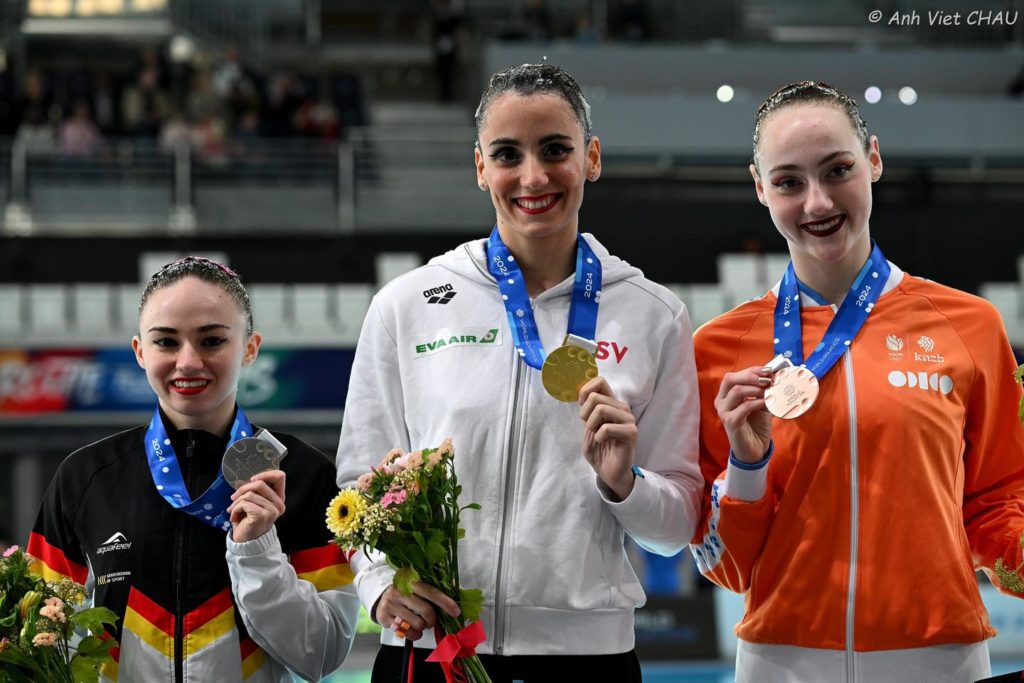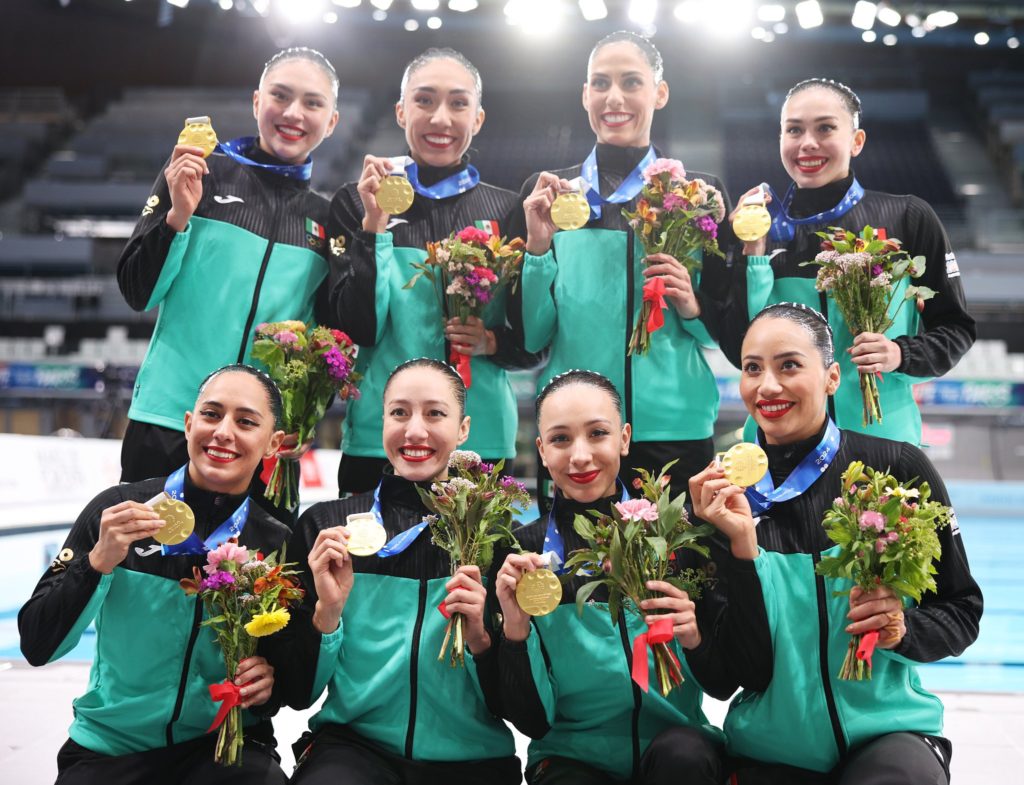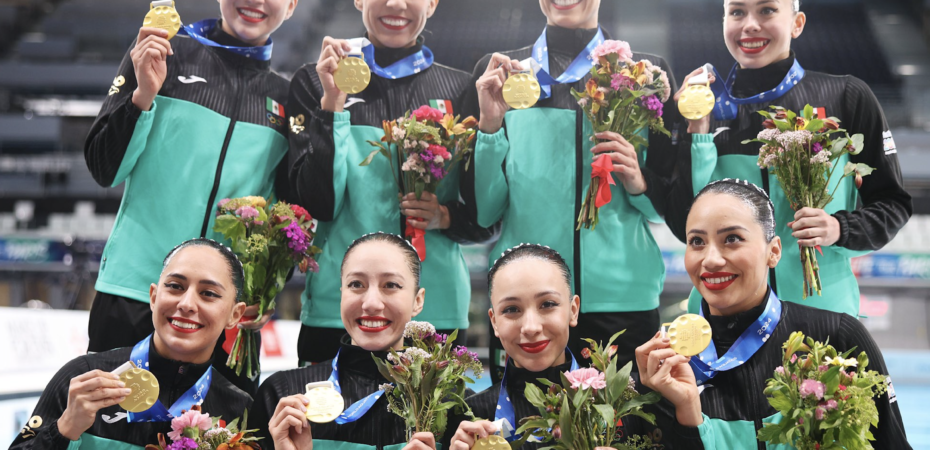Day one at the Paris Artistic Swimming World Cup signaled the Olympic Aquatic Centre’s debut as a competitive arena for Paris 2024. With four events on the programme — women’s and men’s technical solos, technical duets, and technical team — the day was as busy as it gets.
Vasiliki Alexandri of Austria took gold in the women’s technical solo while Gustavo Sanchez of Colombia won the men’s event. Kate Shortman and Isabelle Thorpe of Great Britain stood at the top of the podium in the women’s technical duet. The major upset came in the evening, with team Mexico finishing in first in the team technical event, ahead of the reigning world champions.
Technical Solos (W)
22 athletes took part in the first event of the day, the women’s solo technical. The first athlete to ever compete in this Olympic pool was Mari Moilala of Finland, who’s here to gain experience ahead of future European competitions this season.
The first podium of this World Cup was fully European, with Vasiliki Alexandri of Austria taking gold, followed by Klara Bleyer of Germany and Marloes Steenbeek of the Netherlands.
Competing in her first World Cup of the season, Vasiliki Alexandri unveiled a new routine in Paris and had the highest Degree of Difficulty (DD) of the event with 36.55. As she set her sights on the European Championships in June, the 26-year-old decided to change her music for this technical solo.
“I decided four or five weeks ago to change it,” she said. “For a week, I was stuck home sick and I found this music spontaneously. I thought it had good accents, and I was like, “Why not?” It’s a bit more motivating to bring a new feeling and something new, for me and for the judges, because I had my old music since Fukuoka. I felt good today during my swim. It was a good test with the new routine before the European Championships, which are the highlight for me this year.”
Klara Bleyer, reigning two-time European Junior Champion, of Germany finished second with a total of 234.6200. Just like Alexandri, Bleyer unveiled a new routine here set to the theme of “Spain.” Aiming to improve on her artistic impression, Bleyer had been working on this choreography alongside Spanish Olympian Ona Carbonell for the last few weeks.
“It was really cool to work with her” she said. “I was always a fan of hers, and I loved that she had so much character when she swam. This is something I want to achieve. I know I’ve always been better at technical things, but I want to have more character when I swim, and get more artistic. To have Ona come help me with that was a great decision.”
Marloes Steenbeek of the Netherlands won bronze with a score of 230.1917. Steenbeek only started competing solo internationally this year after performing in duet for her country for the previous two seasons.
Last time she properly competed in solo was in the U-12 age group. Even though it’s been a long time for her, she has surely been incredibly successful so far. After finishing sixth in technical solo and eighth in free solo at the Doha World Championships, she won bronze in free solo at the Beijing World Cup a month ago, and added another bronze to her collection today.
“It’s been new for me,” she said about doing solo this year. “Of course it’s different than working on a duet, but it’s been nice to work on different skills, techniques and emotions in the water. I think I’m very expressive, and I’m an emotional person so I think I can really show it in the water in my routines.”
Steenbeek has a busy season ahead of her, with the European Championships, European Junior Championships and World Cup Super Final ahead of her. As she contributed to the senior duet, she hasn’t competed in the junior category in two years but finds the challenge exciting and looks forward to gaining experience in solo.

Technical Solos (M)
Seven athletes participated in the men’s solo technical competition. Gustavo Sanchez of Colombia claimed gold in the event with a score of 209.8133. World bronze medalist in this event, Sanchez was thrilled to hear his national anthem sound in Paris once more, after winning gold in free solo in 2022, and especially in this Olympic pool.
“This is an honor, and a great trophy for me,” he said. “I was very strong in training, so I am so happy with this performance and result. To see people stand for your anthem is incredible… This is something I can’t express.”
Kenneth Gaudet of the USA claimed silver with 197.4216. Gaudet, two-time world medalist in 2023, was ecstatic to swim in this pool and proud of this result as he gets ready for the World Junior Championships.
“I’ve been really pushing for execution rather than difficulty because of the new apnea time limits in the junior category,” he said. “This competition is more like a stepping stone for me towards Junior Worlds. I’m super proud that it’s working out really well. Swimming in this pool is the biggest honor, not everyone gets to say they swam in the Olympic venue. I’m so glad I’m here and getting to experience this.”
Filippo Pelati of Italy won his second bronze medal on this year’s World Cup circuit with a score 193.6651. After competing in the Beijing stop in April, Pelati quickly returned to Italy and was just performing at the Italian Junior Championships last weekend.
“I’m very proud of this medal because it’s a different bronze than in China,” he explained. “There were only three of us there, but here we were eight, so I’m proud to take the bronze. Maybe I was a bit too focused so I will try to express my creative side more in the free routine. Yes, I’m a little tired (laughs)… But I have a lot of people behind me. My parents came to Paris to support me, that helped me a lot.”
Technical Duet
The women’s duet technical final was off to a not-so-great start, with Japan experiencing issues with the underwater music. The competition was ultimately delayed by over 30 minutes to fix the issue; the Japanese pair ultimately got to swim again a bit later.
Thankfully, Higa Moe and Yasunaga Mashiro, who hadn’t swam in duet since the Asian Games last October, nailed their routine a second time. They managed a basemark-less swim to earn silver with a score of 258.1783.
Kate Shortman and Isabelle Thorpe of Great Britain, vice world-champions in this event, claimed gold here with their “Big Ben” routine and a score of 260.0517. The pair swam last, and when the number “1” popped up next to their scores, they admitted it took them a few seconds to understand they had actually clinched gold.
“I actually didn’t realize at first,” Shortman said. “I was like, ‘Oh cool, we’re first.’ And then I realized, ‘Wait, we swam last. We won!” It was such a cool moment. We’re gold medalists in the Olympic pool, for the first time we swim in it. It was good to get that experience and it gives us confidence going into the Olympics.”
The pair did not feel too much pressure coming into this event after their stellar performances at the Doha World Championships. They explained they simply aimed to focus on their routines and execution, on not getting any basemarks, and on what they can control. More importantly, they wanted to soak in this first swim in the Olympic pool, where they will perform again in a few weeks.
Audrey Lamothe and Jacqueline Simoneau of Canada earned bronze with a score of 255.3716 for their new “Mission Impossible” routine.
“The plan was always to change our tech duet after Doha,” Simoneau explained. “We didn’t really feel a connection with the other one. We sort of inherited it, it also wasn’t really made for us either. This is a duet where we both loved that spy-theme, and it’s truly built for the two of us. It feels like it belongs to us compared to the other one.”
The Canadians also faced a music problem at the start of their routine, when the wrong music started playing. Although they did have to get out and repeat their walk-out, they fortunately did not have to wait too long. Clearly, it didn’t faze them one bit, and they were able to enjoy their swim.
“It’s been very special this week to be able to train in the Olympic pool and to also show our new technical routine,” Lamothe said. “We are very excited to show this new program and a new facet of our duet.”
“We took this as a test event for the Olympics,” Simoneau added. “And not really as a big competition. We’re still training through this World Cup and we’re hoping to really peak at the Olympics, so just to be able to be on the podium here today is already a win for us.”
Both of Ukraine’s duets are next in the rankings, after managing two clean swims. Maryna and Vladyslava Aleksiiva finished fourth (254.6116) ahead of Daria Moshynska and Anastasiia Shmonina in fifth (248.1433).
Jamie Czarkowski and Ruby Remati of the USA, a country which also had two duets entered in the event, placed sixth with a score of 242.2415. Unfortunately, the second American duet, made of Anita Alvarez and Megumi Field, received two basemarks and dropped to 16th.
Hur Yoonseo and Lee Riyoung of South Korea, who clinched the final duet quota spot to the Paris Games back in February, placed seventh with a total of 227.7783.
“I feel so honored to swim in the Olympic pool,” Hur said. “I’m so excited to know that we will come here in a few months and become Olympians. It means a lot to us. When I understood we had qualified, I called [Riyoung] right away, we couldn’t believe it… We are really going to be in the Olympics! We are working really hard now.”
Alisa Ozhogina and Iris Tio of Spain, reigning world bronze medalists, unfortunately received two basemarks today. The pair did receive the highest score in artistic impression for its “Beat It” routine, but it wasn’t enough to make up for the loss in difficulty.
Finally, the duets of Austria and Greece unfortunately scratched from the event because of new difficulty and Coach Card issues.

Technical Team
The last event of the evening felt quite reminiscent of the team technical final at the Fukuoka World Championships in terms of quantity of base marks, and very surprising outcomes. Of the 11 countries competing, only two, Mexico and France’s junior team, managed a clean slate tonight.
Ultimately, it all paid off for Mexico, which claimed gold with a total score of 273.5379 for its “Don’t Stop Me Now” choreography. The country hadn’t competed in this event in Doha, and had drastically increased its DD since its last outing at the Pan American Games, going from 38.95 to 45.70.
China, reigning World Champions, received a basemark on its final hybrid, which was only enough for second place and a score of 269.5396. Similarly, the reigning vice world-champions of Spain received a base mark on one of its free hybrids and dropped to third place with 253.6042.
France made its first outing of the Olympic season, and first since the 2023 World Championships, performing its “Space Travel” choreography. Unfortunately, the French team also received a basemark, and was left outside of the podium with a total score of 247.0567.
“We had been waiting for this competition for a long time,” Ambre Esnault said. “It’s always special to compete at home, but even more so this time in this pool, which we know will have these Olympic rings next time we come back. Sure, we’re a bit disappointed in the result tonight, but we still have a long preparation time ahead of us. The goal of wearing that medal around our necks at the Olympics stays the same. We’re very motivated and we won’t get discouraged by this result.”
Canada unveiled a new “Forest Magicians” routine, but landed in sixth with two basemarks and a final score of 206.3875. The USA, which had lowered its DD since Doha by a little more than a point, had three basemarks and placed seventh with 194.3211.
Australia and Egypt, the last two teams qualified to the Olympics competing in Paris, faced the same fate, with two basemarks each respectively. Egypt also suffered major synchronization deductions after one of its athletes felt unwell but persevered to complete the routine.
The competition continues tomorrow with the women’s duet free, the mixed duet technical and the team free.
ARTICLE BY CHRISTINA MARMET
Cover photo: Stéphane Kempinaire / FFN
If you’ve enjoyed our coverage, please consider donating to Inside Synchro! Any amount helps us run the site and travel costs to cover meets during the season.

